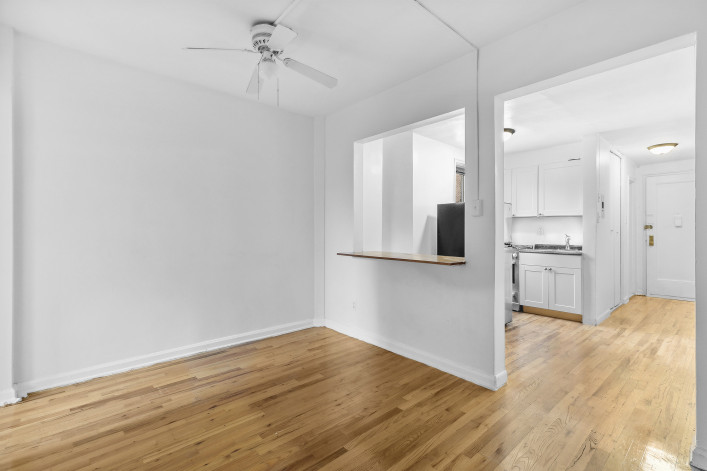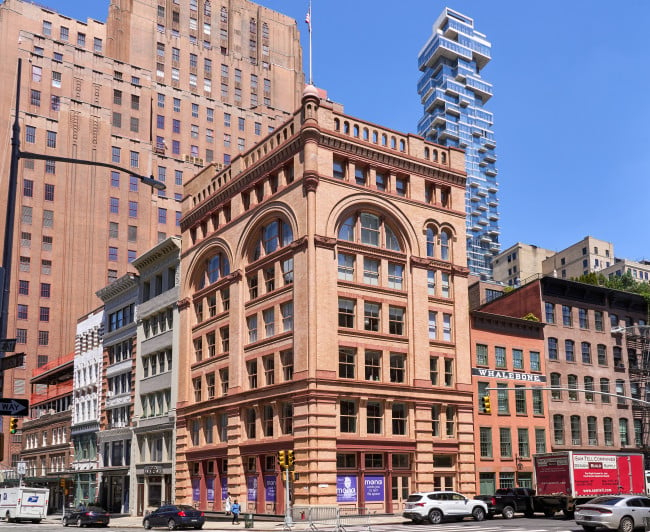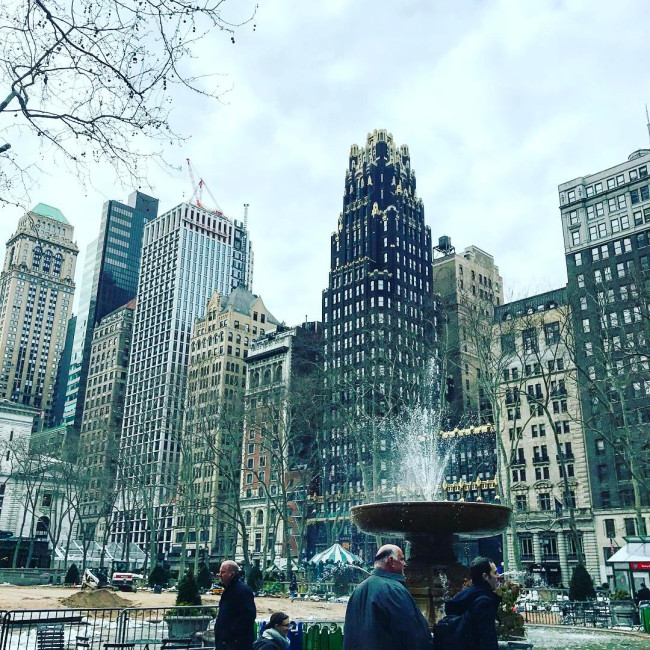Buying a co-op sponsor unit means you don't need board approval, but you'll likely pay a premium
- You can avoid the intense scrutiny of a typical NYC co-op application process
- But you may end up paying a premium with a higher asking price and closing costs
- The units are easy to find on listing sites, however inventory is usually limited

This sponsor co-op apartment, 311 East 25th St., #6A, in Kips Bay, is on the market for $400,000 and available to an all-cash buyer. It has one bedroom and offers unlimited subletting.
Photo courtesy of Afsaneh Hay Gabbay/Compass
If you're on the hunt to buy a co-op in New York City, the term "sponsor unit" may have caught your eye while scanning the city’s listings.
A sponsor co-op is an apartment being sold by the building’s owner or the corporation that established the co-op. There are several advantages to buying this type of apartment; the main benefit is you get to skip the board approval process—a huge relief for many buyers.
Most co-op buildings were converted from rental buildings in the 1970s and 1980s. Existing tenants had the option to buy their apartments or keep renting. If a tenant didn’t buy, the sponsor retained ownership of the apartment and continued renting it to the tenant. When the tenant moves out and the building owner sells the unit, you’ll see the apartment listed as a sponsor unit.
[Editor's note: An earlier version of this article was published in July 2023 and has been updated with new information for June 2024.]
Keep in mind that sponsor apartments can be slightly more expensive than resale co-ops, in spite of the wear and tear they may have faced as a rental. These places can also have higher closing costs than regular units.
Consider this your go-guide to sponsor apartments so you know what's involved in buying one.
You skip the co-op board approval process
Hands down, avoiding this nerve-wracking step is the biggest advantage of buying a sponsor apartment. In a typical co-op purchase, the application process can be extremely invasive with intense scrutiny of your finances as well as your character.
In addition to jumping through fewer financial hoops, the buying process is also quicker in a sponsor sale, since you don’t have to wait for the review of your board package and an interview.
With a sponsor apartment, you will still need to have your finances assessed. But as long as your offer is accepted—and assuming you can get a mortgage if you are financing—you won’t need further vetting.
“Buying in a sponsor-owned co-op allows you to finance as much as the banks will allow you,” said Melissa Cohn, regional vice president of William Raveis Mortgage.
So if the loan amount is conforming—up to $1,149,825 in NYC—then it’s possible to get as much as 97 percent financing, she said. This is in contrast to a resale co-op where the board often limits financing to 80 percent.
Sponsor units open up opportunities for buyers with less traditional incomes—freelancers, consultants with contract work, or those who are self-employed.
“There are banks that do not require income verification or use alternative means of verifying income if qualifying using conventional loans doesn’t work,” Cohn said.
The rules about these transactions will still be dictated by the by-laws of the individual co-op, but the sponsor doesn’t necessarily have to abide by the same standards, said Patrick Lavell, branch manager at Crosscountry Mortgage.
“It's not uncommon for a sponsor sale to mean that employment or credit issues, down payment requirements, or other common barriers can be modified to accommodate the individual buyer," he said.
You often get original prewar details
Sponsor units will typically have been rented out for decades and, in many cases, are in original condition. They may have attractive prewar details like dentil moldings and herringbone floors. Of course, these architectural features may well be obscured behind the paint applied with every new lease, but they can give the place character that can be difficult to find.
On the other hand, it’s possible the units aren’t in great shape and may require specialists to be brought in to remove lead-based paint or asbestos—or to do a full-scale renovation. In that case, Karen Sonn, a closing attorney at Sonn Associates, said the building’s alteration agreement or sales package may require the incoming buyer to do upgrades to the electric panel, windows, or radiators.
Or they will have been renovated to sell at a higher price, and these sponsor makeovers are not necessarily in keeping with what you would do yourself. Some buyers find themselves re-renovating within a couple of years when the sponsor’s upgrades were not up to par.
What's more, a sponsor does not need board approval for a pre-sale renovation. For example, the sponsor may have installed an in-unit washer/dryer in a building that doesn’t permit it. What usually happens is that “when that purchaser sells, the board will not grandfather that washer/dryer to the next buyer,” Sonn said. (In other words, no such luck—and you may get stuck paying for the machines to be removed.)
Know that inspections are important for “as is” apartments so you know the overall condition of the apartment before buying, and what is involved in the renovation. They can also be useful for the renovated units to help determine the quality of the upgrades.
If you’ve purchased a sponsor apartment, you will still be required to get all renovation plans approved by the co-op board, the building architect, and the management company before you start the project. So make sure you check out the board’s alteration policy before you buy.
“Most buildings have strict rules for renovations: limits on the number of renovations at any one time [or on the] length of any renovation,” Sonn said.
They often cost more than non-sponsor units
All things being equal, sponsor apartments can be more expensive than resale apartments.
Jonathan Miller, president and CEO of real estate appraisal firm Miller Samuel, said the higher price tag is partly because sponsor apartments are often newly renovated. But even if there are two similar renovated or unrenovated apartments and sponsor ownership is the only difference, “you might see a 5 percent or even 10 percent premium on the sponsor unit.”
Plus, if you buy from a sponsor, you would typically not have to pay the transfer tax (more on that below). Chalk it up to paying a premium for not having to go through the board approval process.
Miller said it's not a hard-and-fast rule that sponsor apartments are more expensive, but in situations where a sponsor unit sells for less than a comparative resale, it’s often because the sponsor apartment is “far more derelict in condition than a typical unrenovated non-sponsor apartment."
The closing costs might be higher, too
Most co-ops require buyers to put down 20 to 25 percent of the purchase price, but when you’re buying a sponsor co-op, you might be allowed to pay a smaller down payment of 10 percent.
However, you may face higher closing costs with a sponsor co-op.
That’s because buyers are expected to pay city and state transfer taxes on co-op sponsor sales. This will add a percentage of the purchase price to your closing costs.
The city transfer tax is 1 percent of the purchase price on sales under $500,000 (or 1.425 percent on purchases of $500,000 or more), plus there’s a 0.4 percent state transfer tax. This may be negotiable when it is a resale but is less so if it’s a sponsor unit.
You still need to do your due diligence
Find out as much as you can about the building, the previous tenant, and the sponsor—your broker and your attorney can help you with this.
Ask how many apartments the sponsor owns in the building and how many are owner-occupied. The more apartments that are privately owned in the building, the easier it should be to secure financing, and the more your apartment will hold its value or increase later on.
Banks are more likely to look at the building as a sound investment if most units are not rentals.
Lavell said one of the biggest hurdles for buyers trying to get a mortgage is when a sponsor owns a large number of units. If more than 40 percent of units are owned by one investor, or if more than 50 percent of units are owned by multiple investors, the building’s owner-occupancy ratio would be too low for most lenders.
That means that “the building being deemed non-warrantable, which usually means that a fixed-rate loan may not be available or will be available at a higher rate,” he said.
Beware of legal issues with the previous tenant
Renters in NYC have many protections, so as with any rental unit, you must make sure the prior rental lease was terminated correctly and that the tenant has vacated the property or was properly evicted.
What could happen? One scenario would be that a family member could claim they were living with the previous tenant and was unfairly evicted, or that the apartment was vacated while they were on vacation.
Building rules still apply
Even though you don’t have to get board approval for the purchase of a sponsor apartment, you will still have to abide by the building’s rules and bylaws.
Although the sponsor may not have “control” as defined by the offering plan, there are buildings where the sponsor has a huge vested interest and is still involved. Some buildings actually benefit from the expertise and relationships that the original sponsor or successor sponsor has established, bypassing a management company and getting answers from an individual instead.
Where to find sponsor co-op units
Sponsor units can be found all over the city. The majority are in prewar buildings on the Upper East and Upper West Side of Manhattan, though there are a sprinkling of new development co-ops with sponsor units in the Bronx and Queens as well.
Depending on your needs and the available inventory, prepare to shop for six to 12 months for a sponsor-owned apartment. Some buyers who want to avoid board approval are always on the hunt for them.
Let your broker know you are interested in sponsor apartments. If you are searching for these co-ops on listing sites, put the terms “sponsor unit” or “no board approval” in the search parameters. Some listing sites like StreetEasy have a sponsor filter; but there aren’t a lot of units available. There were just 31 listings for sponsor units across the five boroughs on a recent search.
Previous versions of this article included writing and reporting by Tracy Kaler and Emily Myers.
You Might Also Like































